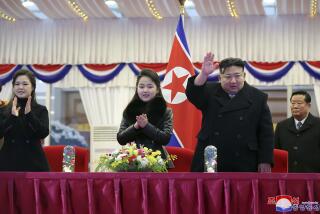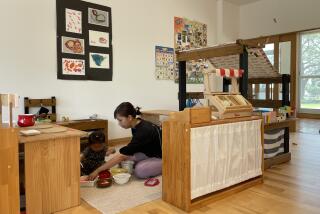Japan Welcomes a Little Prince
TOKYO — Succession crisis postponed.
Japan’s Princess Kiko gave birth today to a reportedly healthy boy, a 5-pound, 10-ounce solution to the imperial family’s need for a next-generation heir to the males-only Chrysanthemum Throne.
The baby is the first boy born into the royal family in more than 40 years.
He is third in line to a throne that claims a mystical lineage of 2,600 years and a male bloodline that can be traced to the 5th century. He will be named within a week.
The birth of a boy would appear to avert a wrenching national debate between traditionalists and modernists over whether to allow women to ascend to the throne.
The 39-year-old Kiko’s surprise pregnancy -- she has two daughters, 14 and 11 -- had stifled the discussion over the imperial family’s lack of male heirs.
The baby follows his uncle, Crown Prince Naruhito, 46, and his father, Prince Akishino, 40, in the line of succession.
He was born in a Tokyo hospital by caesarean section, which had been scheduled since late August and which allowed Japanese media to stake out the hospital for wall-to-wall coverage on morning TV shows.
National newspapers, which had prepared two separate special editions, hit the “It’s a Boy!” switch.
But the birth of a possible future emperor did not trigger widespread displays of euphoria, despite the media frenzy.
Polls show the royal family remains broadly, if tacitly, appreciated by the Japanese public. But emperors have not been worshiped as gods since Emperor Hirohito renounced his claim to divinity after World War II.
Emperor Akihito, 72, has no formal political influence, though the imperial institution retains symbolic power for nationalists.
That group, which includes Shinzo Abe, the man expected to become prime minister this month, blocked recommendations by a government panel this year to revise the 1947 law that prevents women from ascending to the throne.
For many in Japan, the arrival of a new member of the imperial family was more a matter of curiosity than constitutional significance. That is in part because of the personal drama unfolding in the imperial household: Crown Princess Masako, Naruhito’s Harvard-educated wife, has a stress-related illness that has drastically curtailed her public appearances and reportedly raised tensions within the family.
The couple has one child, 4-year-old daughter Aiko.
The Japanese media attribute Masako’s illness to pressure by traditionalists to produce a male heir.
The media have also chronicled her strained relations with her in-laws and with the Imperial Household Agency, the institution that manages the family’s public affairs and that has termed Masako’s illness an “adjustment disorder.”
Naruhito has criticized the agency for its treatment of his wife, a rare move that sparked tensions with his brother, royal watchers say.
“At times like this we get interested in the imperial family, and we get lots of information from TV news shows and weekly magazines, whether we like it or not,” said Chieko Okano, 33, a Tokyo mother expecting her second child in November.
“I feel a little sorry for the imperial family.”
For centuries, the male lineage was sustained by the offspring of imperial concubines, a practice the current royal family shunned.
“We need a grand plan for the long-term future of the nation,” said professor Hideo Shinozawa of Gakushuin University, who taught both princes.
“The old law was supported only by having many concubines and other branch families. I think we should allow empresses.”
*
More to Read
Sign up for Essential California
The most important California stories and recommendations in your inbox every morning.
You may occasionally receive promotional content from the Los Angeles Times.










